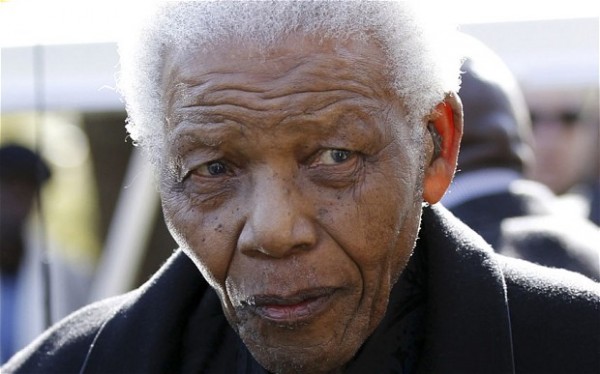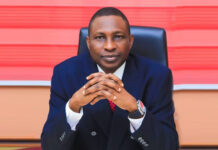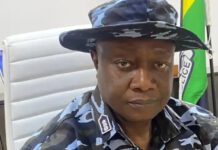Ngqwara, South Africa — For weeks, South Africans have been holding a vigil for their first democratically elected president, Nelson Mandela.
 The 94-year-old statesman has been lying in a hospital in Pretoria for more than a month.
The 94-year-old statesman has been lying in a hospital in Pretoria for more than a month.
Away from the capital, in the rolling farmlands where Mandela was born and raised, many South Africans believe his precarious condition has been adversely affected by a messy public dispute between members of his family.
“Some of us believe it could be that the suffering [Mandela] is enduring in the hospital at the moment has to do with the fact that his dispute has not been resolved,” said Patikile Holomisa, a lawmaker as well as the president of the Congress of Traditional Leaders.
“We believe that our ancestors through their spirits are looking after us,” Holomisa added. “When we displease them, they bring calamity; all sorts of discomfort to the family.”
The family dispute erupted into full public view last week when one of Mandela’s daughters took one of his grandsons to court, after accusing him of secretly moving the remains of three of Mandela’s buried children from the family cemetery in 2011.
Makaziwa Mandela embraced her attorney when she won the case in a regional high court in South Africa’s Eastern Cape Province. “It’s a private matter,” was her only comment to the media at the court.
The next day a sheriff used heavy metal pincers to snap open the padlock on a gate at the village of Mandela’s grandson, Mandla. South African authorities retrieved three coffins and bought them for reburial in Qunu, the small village where the former president maintains a modest home.
“I still feel that it was a premature act,” said Mandla Mandela, in an exclusive interview with CNN on Wednesday.
“The issue should have been exhausted through internal structures of the family and unfortunately that wasn’t seen,” he added.
The 39-year-old grandson was speaking on a windy hilltop in the village of Ngqwara, where he had just distributed blankets to several dozen elderly men and women. The crowd began the ceremony by reciting prayers. Later, some elderly women sang and danced in gratitude after receiving their donations.
Mandla Mandela is a chief, or traditional ruler, in this poverty-stricken corner of South Africa.
In this deeply traditional heartland, there are other prominent community leaders who agree that the Mandela family should have turned to distinctly African methods of mediation to solve their dispute, rather than Western-style courts.
“If the people are going to abandon the roots to which Madiba belongs and go and hang on to the branches of a foreign tree, such as the Westernized courts, then there is going to be a problem,” said Holomisa.
The Mandela family dispute has exposed differences between the culture and values of rural black South Africa and the country’s modern legal and medical system.
Some here argue it is unnatural and unfair to keep an ailing man alive with modern medical machines.
Others fear Mandela may suffer longer in hospital, because the remains of his three children were moved without accompanying prayers.
“There was no ritual that that was performed when the bones were moved,” explains Vuyo Teti, a 25-year-old agricultural university student.
“The old people are saying you need to consider the spirit and the spiritual being, not only the bones.”
Though raised in Qunu, Mandela migrated as a young man to South Africa’s largest city Johannesburg, where he eventually opened the country’s first black law firm.
Mandela then spent the bulk of his adult life, either imprisoned by the former Apartheid regime or struggling in freedom to establish democracy in South Africa.
Over the last decade, he retired from public view and chose to move back to the land of his childhood.
Traditional community leaders like Holomisa cite that as proof that Mandela wished to return to his roots.
“He straddled both worlds, the African and the western,” said Holomisa.
“This man was a traditional man,” he added. “And in the twilight of his life, he should be allowed to be who he was.”





Afrcan traditonal beliefs indeed at work. U see dis is d unfortunate thing about not having a male heir. Mandela has no living son.All d male Mandelas we are hearing of are his grandsons. They are offsprings of Mandelas daughters who should go to their own fathers lineage- indeed they have no business Answering Mandelas name at all bcos they are simply not Mandela.
Worst still Mandela permited one of them Mandla to go and inherit his Chieftaincy which he is not entitleD to. Those boys are only bearing d name Mandela bcos of d political clout and economic resources it bequeaths to them with little or no effort, abandoning and despising their own fathers in d process. They really have a lot of cleansing to do before and after d death of Pa Mandela otherwise their ancestors will continue to haunt theM.
Lest I forget, d writer was right to point out dat is highly sacrilegous to exhume and rebury peole at will without d appropriate rites or prayers. It is believed by all religions dat d spirit of such people does not rest in peace but continues to haunt d perpetrators of such dastardly acts. Then exhuming d bodies of 3, not one, dead person is indeed fearful. That family is headed for more catastrophe, mark my warnings